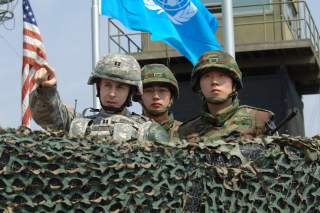Could America Pull Troops Out of South Korea If It Wanted?
The implications could be catastrophic.
Many believe that China should logically work with the United States on the development of a joint strategy to persuade North Korea to give up nuclear weapons peacefully. While China has quietly exercised influence and tightened its sanctions upon North Korea, Chinese cooperation has not been absolute. China doubtlessly seeks to exert strategic pressure on the United States, its principal rival in the region. China could well be trying to take advantage of what it sees as the strategic over-extension of the United States in an era where its global domination as an economic and military power is not as overarching as it was during the Cold War, or in the immediate years after the Soviet Union’s collapse.
China likely perceives the United States as strategically stretched, simultaneously facing military challenges not just in Korea, but across the world, ranging from Afghanistan to Iraq, to Syria, to Israel and Palestine, to Iran, to Russia, to Africa, to the East and South China Seas. With rising U.S. national debt, growing annual budget deficits, and complex American military commitments throughout the world, China could be pursuing a Korean strategy which is intended at least in part to create further strategic pressure on the United States, helping to press its resources. Although China certainly does not want a nuclear war on the Korean peninsula, keeping the United States pressured with Korean challenges may also help achieve Chinese foreign policy objectives.
Short of going to war, or persuading North Korea to surrender its nuclear option, the United States needs a credible policy that more realistically places North Korea within the context of broader strategic challenges faced today in the region rather than in a 1950’s era, conventional invasion scenario whose likelihood has long since passed. Assuming that nuclear deterrence can continue to work with North Korea, as it has with China since Mao, and with Russia since Stalin, North Korea is not a paramount threat to the United States. The current strategy, embodied by tough UN trade sanctions and nuclear deterrence, could be continued indefinitely without too much budgetary cost or drain on United States resources.
Under the nuclear umbrella, the United States could prudently, under its treaty obligations, leave it to a powerful and prosperous South Korea to initially hold off the bulk of any North Korean conventional attack with only a small residual of U.S. headquarters type forces in support, to coordinate the deployment of responding American military power.
From this perspective, North Korea has become more a strategic distraction for the United States, than a first tier threat, but any disentanglement has its complications, particularly for the maintenance of U.S. credibility. Hence the Administration’s possible reassessment of U.S. troop presence in Korea has significant strategic logic but will require delicate balancing to assure that any possible troop reductions over next years are not perceived as evidence of U.S. decline and withdrawal from Asia. To help address that if necessary, the U.S. and South Korean governments could also continue discussions on the return of U.S. tactical nuclear weapons capability to the South, a process raised last fall after North Korea’s hydrogen bomb test.
Whether used as a bargaining chip or not in nuclear summit discussions with North Korea, a pullback of U.S. troops from South Korea makes strategic sense. The U.S. Army could bring its elements of the Second Infantry Division home after decades of deployment. Those valuable assets could then be available for multiple future contingencies not just in South Korea, but around the world. Handled skillfully, withdrawing U.S. forces from the Peninsula would not be a retreat into isolationism but rather a strategic repositioning of forces, better enabling the United States military to respond to future global trends and challenges, rather than to frozen scenario’s originating more than sixty-five years in the past.
Ramon Marks is a retired New York international lawyer.
This article originally appeared on Real Clear Defense.
Image: Wikimedia Commons

